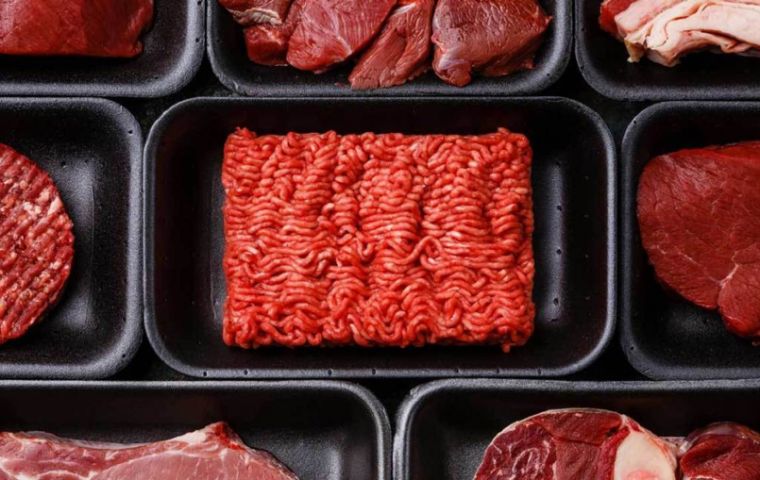MercoPress. South Atlantic News Agency
Deep changes in China's beef market expected for 2023, USDA report
 Beef consumption in China's domestic market should remain, supported by a 4% increase in local output, estimated at 7.4 million tons
Beef consumption in China's domestic market should remain, supported by a 4% increase in local output, estimated at 7.4 million tons Economic hardships, combined with the government’s determination to keep its zero-tolerance policy for Covid-19, are likely to bring Chinese beef imports down by 19.4% in 2023, according to the latest report by USDA
US Department of Agriculture estimates that domestic beef consumption in China is likely to fall by 3% next year to 9.9 million tons, bringing import levels to 2.5 million tons, down from 3.1 million tons this year.
The report assesses that “beef is considered a luxury product by consumers and, thus, demand is expected to be more impacted by economic prospects than the price itself.” As a result, beef consumption in the domestic market should remain heated, supported by a 4% increase in local output, estimated at 7.4 million tons. However, consumption in hotels and restaurants, the primary destination for high-end cuts, should be impacted by the country’s Covid-19 restrictions.
Considering the profile of Brazilian beef exports to China, concentrated in forequarters used precisely in preparing industrialized products and other popular dishes, the market assesses that the drop in Chinese imports will not affect Brazilian shipments, which are currently at record levels.
However the case is not the same for those Mercosur suppliers of prime beef cuts, mainly because they are geared to hotels and restaurants.
According to the latest market balance report released by the Brazilian meatpackers association (Abrafrigo), beef exports from Brazil to China from January to August reached 786,872 tons, a result 31% higher than that observed in the same period last year, with a revenue 69.7% higher, at US$ 5.32 billion. The numbers represent 51.8% of total Brazilian beef exports and 60.3% of the revenue generated in this period.
“Brazil is in a somewhat comfortable position in comparison to its competitors. The United States, for example, is in the process of reducing its herd size; Australia is in the process of recomposing its beef industry; the European Union is contracting, whereas Argentina an0d Uruguay lack the productive capacity that Brazil has. So, even if China cuts beef purchases, Brazil remains its best option for importing this protein. We saw a reduction in Chinese imports from other countries this year, but imports from Brazil kept rising,” argues Safras & Mercado analyst Fernando Iglesias.
The outlook for Brazilian beef companies such as JBS, Marfrig, and Minerva, on the other hand, is less promising. With Brazil’s per capita consumption at its lowest in more than two decades, reflecting the population’s loss of purchasing power, these corporations have only been able to achieve good results due to their activities in North America and other South American countries. According to the USDA, these are the locations that the projected decline in Chinese imports will most impact.
“While China’s reduced purchases impact the operations of these large meatpackers in these markets, we must also realize that these markets have a strong domestic market to fall back on to.” “The United States is a meat-eating machine,” Iglesias observes.
In this context, import costs have risen due to inspection measures and Covid-19 detection in refrigerated cargo at Chinese ports, as well as the suspension of export licenses of meatpacking units in various countries (including Brazil) and an increase in local supplies in the first half of this year.
USDA estimates, there are signs that some importers may sell part of the volume acquired in 2022, albeit at values below the acquisition cost, to avoid expenses with storage and refrigeration after a 37% rise in import prices in the first semester of this year.




Top Comments
Disclaimer & comment rulesCommenting for this story is now closed.
If you have a Facebook account, become a fan and comment on our Facebook Page!